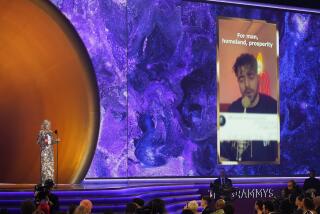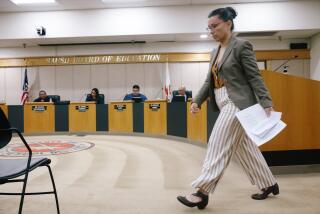Israelis Irate at Thought of Palestinian Poet in Schools
- Share via
JERUSALEM — Record!
I am an Arab
You have stolen the orchards
Of my ancestors
And the land
Which I cultivated
Along with my children
And you left us with those rocks
*
There is nothing subtle about the poetry of Mahmoud Darwish.
Widely regarded as the Palestinians’ foremost poet, Darwish writes in bold nationalist strokes of life in desolate exile, of the painful longing for a homeland and of the anger his people feel toward Zionism.
And soon, if Israeli Education Minister Yossi Sarid has his way, the writings of Darwish will become provocative food for thought for Israeli high school students. Sarid has decided to include Darwish and other Palestinian poets for the first time in the curricula of literature classes in Israeli schools.
That announcement quickly unleashed a political tempest. On Monday, Sarid was hauled before the education committee of the Israeli parliament, the Knesset, and grilled by indignant legislators--some of whom are threatening to try to use the matter to topple the government next week. And Prime Minister Ehud Barak, through a spokesman, indicated that he felt “the time is not ripe” to invite Darwish’s verse into the Israeli schoolroom.
“So the prime minister said it’s too early. I’m saying it’s about time,” Sarid told reporters later. “It’s very, very important to know each other . . . that we know . . . our neighbors better and they know much better about us.”
Everything in Israel is political, and so the objections being voiced are as much about Sarid’s motives as they are about Darwish’s words.
A staunchly secular leftist, Sarid stands accused of using the curriculum changes to tweak his opponents, primarily the religious, conservative leaders of the Shas Party who also form part of Barak’s unruly coalition government. Sarid and Shas routinely do battle over philosophy, budgets and control.
When Shas defected from the coalition last week in a crucial vote over making peace with Syria, many politicians blamed Sarid for having alienated the party. Among his actions, Sarid has clipped the wings of his deputy minister, a Shas appointee.
Barak clearly does not want another showdown and so is distancing himself from Sarid’s decision on Darwish. With peace negotiations in trouble with both Syria and the Palestinians, a Barak aide said, it is a “delicate” time and Darwish’s “problematic words can cause more damage than benefit.” (The no-confidence motion next week is highly unlikely to bring down Barak’s government, but it could be embarrassing.)
Criticism also came Monday from some of those whose politics are more akin to Sarid’s but who find Darwish simply too anti-Israel. And the leftist Haaretz newspaper wrote in an editorial that Sarid had gone too far in “interfering” with classroom instruction.
The right wing was especially furious. Lessons using Darwish would erode the “Jewish-Zionist” character of the state of Israel, they said.
“At this rate,” grumbled Health Minister Shlomo Benizri of the Shas Party, “he will soon order the teaching of the Koran instead of the Torah.”
For Sarid, however, adding Darwish to Israeli reading lists is part of a gradual, fundamental change in Israeli education that has sought to widen perspectives and give a more balanced portrayal of the founding of the Jewish state.
Under Sarid’s direction, students now learn about a 1956 massacre of 47 Arab villagers by Israeli soldiers and hear theories questioning whether Israel was really the underdog during its 1948 War of Independence.
This overhaul of the nationwide curriculum, Sarid said, is designed to make the courses reflect the multicultural society of today’s Israel. Writers from working-class Israeli towns and from immigrant communities, such as those from the former Soviet Union, will be put on the list in addition to Palestinian poets, who include Naim Araidi and Siham Daoud.
No single writer so embodies the Palestinian cause and the struggle for a homeland as Darwish. While some of his poems reject the existence of Israel, others are seen as more tolerant.
Darwish, 58, was born in a village near what is today the Israeli town of Acre, was eventually placed under house arrest and lived most of his adult life in exile. He was a prominent member of the Palestine Liberation Organization of Yasser Arafat but quit in 1993 to protest the landmark Oslo peace accords, which he contended made too many concessions to Israel.
In one of his most famous poems, “Identity Card,” the voice is that of a Palestinian who confronts an Israeli soldier and, by extension, the military occupation government. It is infused with Darwish’s common themes of defiance and resentme
More to Read
Sign up for Essential California
The most important California stories and recommendations in your inbox every morning.
You may occasionally receive promotional content from the Los Angeles Times.














